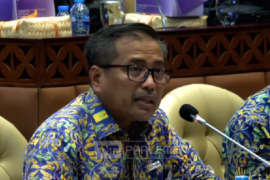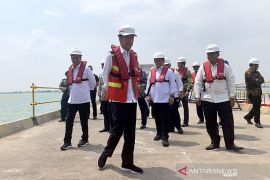Vice President Jusuf Kalla recently stated that the HST is being developed on the basis of a business-to-business scheme such that the government only concerns with its licensing, while its land clearance has become the responsibility of companies grouped in the consortium.
"There is no problem with the licensing of the project. The problem lies with the land clearance. Matters on land in Indonesia are different compared to other countries like China, where all land belongs to the state. In Indonesia, most of the land is owned by the people. Therefore, the land must be acquired first before a project could be carried out," Kalla told participants of the National Resilience Institute (Lemhanas) course in Jakarta last month (Aug 28).
The Jakarta-Bandung HST project is being developed by a consortium of Chinese companies and Indonesian state-owned enterprises (BUMN).
According to online portal www.indonesia-investments.com, Kereta Cepat Indonesia China (KCIC) is tasked with constructing the high-speed railway. KCIC consists of a consortium called Pilar Sinergi BUMN Indonesia (60 percent stake) and Chinas largest rail operator China Railway International Co. Ltd. (40 percent).
The Pilar Sinergi BUMN Indonesia consortium consists of four Indonesian state-owned companies, namely Wijaya Karya, Kereta Api Indonesia, Jasa Marga, and Perkebunan Nusantara VIII.
Kalla revealed that the government has a supervisory function regarding the project, but for the land acquisition, it is the responsibility of the Indonesian and Chinese companies, which are working together.
Therefore, Kalla encouraged the state-owned enterprises in Indonesia and China, incorporated in the consortium of PT Kereta Api Cepat Indonesia China (KCIC), to settle the land acquisition constraint, so that the construction of the US$6.07 billion project could be implemented immediately. "Land acquisition is the main problem, it is only a matter of how many kilometers could be acquired to start," he noted.
In the meantime, China has expressed confidence that the construction of the HST would be completed on time by the end of 2019, as expressed by China Railway Group Limited (CREC) director.
"The project continues to run on schedule and in line with the expectations of the governments of both countries. This year, we are focusing on land acquisition as the preparation stage of the construction," Director of the CREC Asian Business Department Li Jianping remarked, while receiving journalists from ASEAN countries in Beijing on Friday.
According to Jianping, the Indonesian government has also played a more active role to solve the issues that have often become the bottleneck of infrastructure development in the country.
"All went well, we have been doing a lot of negotiations, with various details being discussed at both the government and the investor level," he explained.
According to indonesia-investments.com, although the groundbreaking ceremony for the Jakarta-Bandung railway project was conducted in Jan 2016, the project, similar to many other infrastructure projects in Indonesia, was plagued by a long delay.
This delay was primarily attributed to bureaucracy related to the operational and construction permits for the 142.3-kilometer-long railway project.
Reportedly, the China Development Bank had been hesitant to sign a loan for the project because the land acquisition process for the railway project had not been completed (and not all permits had been collected).
Considering the lengthy and costly land acquisition process in Indonesia, the state-owned Chinese lender found it too risky to agree to the loan sooner. Whether all required land has now been acquired remains unclear.
However, Hanggoro Budi Wiryawan, Head of the consortium, and Hu Huaibang, Chairman of the China Development Bank, eventually signed the loan on Sunday (May 14) in Beijing, China.
The signing was witnessed by Indonesian President Joko Widodo (Jokowi) and Chinese President Xi Jinping. Jokowi is also in Beijing to attend the Belt and Road Forum for International Cooperation between May 14 and 15, 2017.
The KCIC was granted a 50-year concession period that will commence on May 31, 2019, when the high-speed railway is scheduled to become operational. It is expected to require 40 years to reach the breakeven point.
Trains between Jakarta and Bandung are estimated to be able to carry 29 thousand passengers per day, with ticket prices expected at Rp200 thousand (approx. US$15.4) per passenger. Trains will be able to reach a maximum speed of 250 kilometers per hour.
The Jakarta-Bandung railway is expected to boost employment in West Java. For the three-year construction phase, 39 thousand workers are needed, while an additional 48 thousand workers are needed in the next 15 years for the construction of various property and infrastructure projects related to the Jakarta-Bandung railway, as new economic centers and cities are expected to rise along the 142-kilometer-long route.(*)
Reporter: Andi Abdussalam
Editor: Heru Purwanto
Copyright © ANTARA 2017











